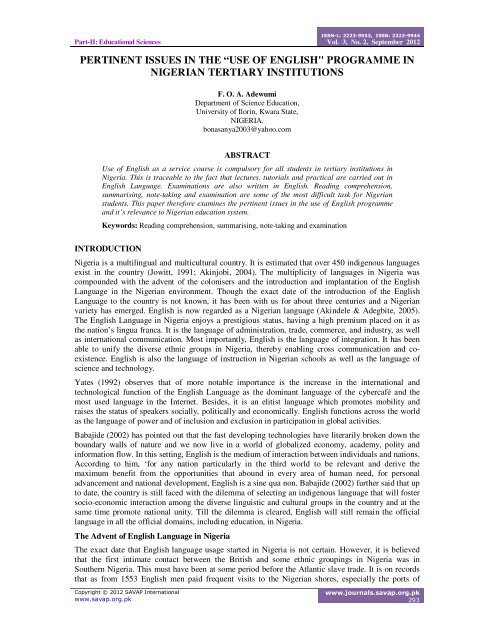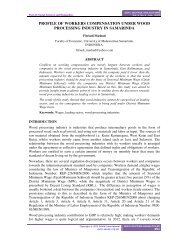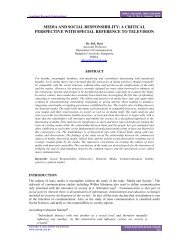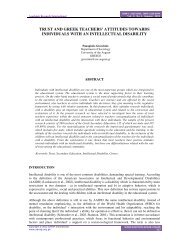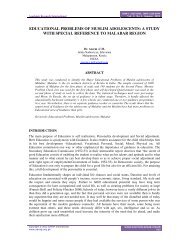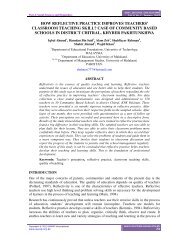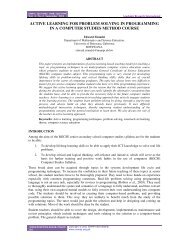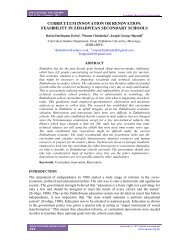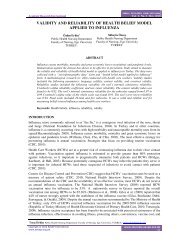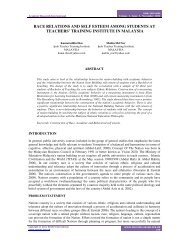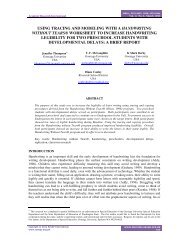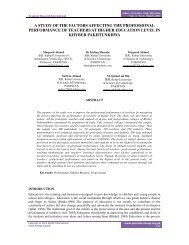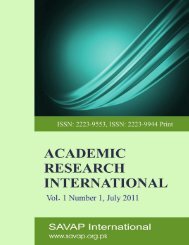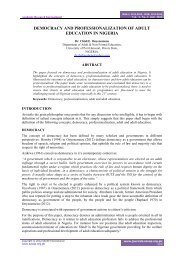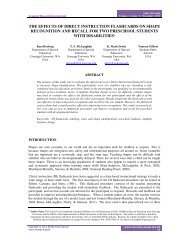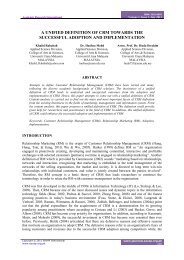pertinent issues in the âuse of english" programme in nigerian ...
pertinent issues in the âuse of english" programme in nigerian ...
pertinent issues in the âuse of english" programme in nigerian ...
Create successful ePaper yourself
Turn your PDF publications into a flip-book with our unique Google optimized e-Paper software.
Part-II: Educational Sciences<br />
ISSN-L: 2223-9553, ISSN: 2223-9944<br />
Vol. 3, No. 2, September 2012<br />
PERTINENT ISSUES IN THE “USE OF ENGLISH" PROGRAMME IN<br />
NIGERIAN TERTIARY INSTITUTIONS<br />
F. O. A. Adewumi<br />
Department <strong>of</strong> Science Education,<br />
University <strong>of</strong> Ilor<strong>in</strong>, Kwara State,<br />
NIGERIA.<br />
bonasanya2003@yahoo.com<br />
ABSTRACT<br />
Use <strong>of</strong> English as a service course is compulsory for all students <strong>in</strong> tertiary <strong>in</strong>stitutions <strong>in</strong><br />
Nigeria. This is traceable to <strong>the</strong> fact that lectures, tutorials and practical are carried out <strong>in</strong><br />
English Language. Exam<strong>in</strong>ations are also written <strong>in</strong> English. Read<strong>in</strong>g comprehension,<br />
summaris<strong>in</strong>g, note-tak<strong>in</strong>g and exam<strong>in</strong>ation are some <strong>of</strong> <strong>the</strong> most difficult task for Nigerian<br />
students. This paper <strong>the</strong>refore exam<strong>in</strong>es <strong>the</strong> <strong>pert<strong>in</strong>ent</strong> <strong>issues</strong> <strong>in</strong> <strong>the</strong> use <strong>of</strong> English <strong>programme</strong><br />
and it’s relevance to Nigerian education system.<br />
Keywords: Read<strong>in</strong>g comprehension, summaris<strong>in</strong>g, note-tak<strong>in</strong>g and exam<strong>in</strong>ation<br />
INTRODUCTION<br />
Nigeria is a multil<strong>in</strong>gual and multicultural country. It is estimated that over 450 <strong>in</strong>digenous languages<br />
exist <strong>in</strong> <strong>the</strong> country (Jowitt, 1991; Ak<strong>in</strong>jobi, 2004). The multiplicity <strong>of</strong> languages <strong>in</strong> Nigeria was<br />
compounded with <strong>the</strong> advent <strong>of</strong> <strong>the</strong> colonisers and <strong>the</strong> <strong>in</strong>troduction and implantation <strong>of</strong> <strong>the</strong> English<br />
Language <strong>in</strong> <strong>the</strong> Nigerian environment. Though <strong>the</strong> exact date <strong>of</strong> <strong>the</strong> <strong>in</strong>troduction <strong>of</strong> <strong>the</strong> English<br />
Language to <strong>the</strong> country is not known, it has been with us for about three centuries and a Nigerian<br />
variety has emerged. English is now regarded as a Nigerian language (Ak<strong>in</strong>dele & Adegbite, 2005).<br />
The English Language <strong>in</strong> Nigeria enjoys a prestigious status, hav<strong>in</strong>g a high premium placed on it as<br />
<strong>the</strong> nation’s l<strong>in</strong>gua franca. It is <strong>the</strong> language <strong>of</strong> adm<strong>in</strong>istration, trade, commerce, and <strong>in</strong>dustry, as well<br />
as <strong>in</strong>ternational communication. Most importantly, English is <strong>the</strong> language <strong>of</strong> <strong>in</strong>tegration. It has been<br />
able to unify <strong>the</strong> diverse ethnic groups <strong>in</strong> Nigeria, <strong>the</strong>reby enabl<strong>in</strong>g cross communication and coexistence.<br />
English is also <strong>the</strong> language <strong>of</strong> <strong>in</strong>struction <strong>in</strong> Nigerian schools as well as <strong>the</strong> language <strong>of</strong><br />
science and technology.<br />
Yates (1992) observes that <strong>of</strong> more notable importance is <strong>the</strong> <strong>in</strong>crease <strong>in</strong> <strong>the</strong> <strong>in</strong>ternational and<br />
technological function <strong>of</strong> <strong>the</strong> English Language as <strong>the</strong> dom<strong>in</strong>ant language <strong>of</strong> <strong>the</strong> cybercafé and <strong>the</strong><br />
most used language <strong>in</strong> <strong>the</strong> Internet. Besides, it is an elitist language which promotes mobility and<br />
raises <strong>the</strong> status <strong>of</strong> speakers socially, politically and economically. English functions across <strong>the</strong> world<br />
as <strong>the</strong> language <strong>of</strong> power and <strong>of</strong> <strong>in</strong>clusion and exclusion <strong>in</strong> participation <strong>in</strong> global activities.<br />
Babajide (2002) has po<strong>in</strong>ted out that <strong>the</strong> fast develop<strong>in</strong>g technologies have literarily broken down <strong>the</strong><br />
boundary walls <strong>of</strong> nature and we now live <strong>in</strong> a world <strong>of</strong> globalized economy, academy, polity and<br />
<strong>in</strong>formation flow. In this sett<strong>in</strong>g, English is <strong>the</strong> medium <strong>of</strong> <strong>in</strong>teraction between <strong>in</strong>dividuals and nations.<br />
Accord<strong>in</strong>g to him, ‘for any nation particularly <strong>in</strong> <strong>the</strong> third world to be relevant and derive <strong>the</strong><br />
maximum benefit from <strong>the</strong> opportunities that abound <strong>in</strong> every area <strong>of</strong> human need, for personal<br />
advancement and national development, English is a s<strong>in</strong>e qua non. Babajide (2002) fur<strong>the</strong>r said that up<br />
to date, <strong>the</strong> country is still faced with <strong>the</strong> dilemma <strong>of</strong> select<strong>in</strong>g an <strong>in</strong>digenous language that will foster<br />
socio-economic <strong>in</strong>teraction among <strong>the</strong> diverse l<strong>in</strong>guistic and cultural groups <strong>in</strong> <strong>the</strong> country and at <strong>the</strong><br />
same time promote national unity. Till <strong>the</strong> dilemma is cleared, English will still rema<strong>in</strong> <strong>the</strong> <strong>of</strong>ficial<br />
language <strong>in</strong> all <strong>the</strong> <strong>of</strong>ficial doma<strong>in</strong>s, <strong>in</strong>clud<strong>in</strong>g education, <strong>in</strong> Nigeria.<br />
The Advent <strong>of</strong> English Language <strong>in</strong> Nigeria<br />
The exact date that English language usage started <strong>in</strong> Nigeria is not certa<strong>in</strong>. However, it is believed<br />
that <strong>the</strong> first <strong>in</strong>timate contact between <strong>the</strong> British and some ethnic group<strong>in</strong>gs <strong>in</strong> Nigeria was <strong>in</strong><br />
Sou<strong>the</strong>rn Nigeria. This must have been at some period before <strong>the</strong> Atlantic slave trade. It is on records<br />
that as from 1553 English men paid frequent visits to <strong>the</strong> Nigerian shores, especially <strong>the</strong> ports <strong>of</strong><br />
Copyright © 2012 SAVAP International<br />
www.savap.org.pk<br />
www.journals.savap.org.pk<br />
293
ISSN-L: 2223-9553, ISSN: 2223-9944<br />
Vol. 3, No. 2, September 2012<br />
Academic Research International<br />
Ancient Ben<strong>in</strong> and old Calabar, and <strong>the</strong> type <strong>of</strong> communication which evolved between <strong>the</strong> English<br />
men and <strong>the</strong> Nigerians was a simplified k<strong>in</strong>d <strong>of</strong> communication <strong>in</strong> English called Pidg<strong>in</strong>.<br />
English has come a long way <strong>in</strong> Nigeria. The language came with colonialism <strong>in</strong> <strong>the</strong> mid-n<strong>in</strong>eteenth<br />
century. Before English became a missionary potent tool <strong>of</strong> colonial <strong>in</strong>teraction, <strong>the</strong> European<br />
missionaries had found it heritage necessary to converse with <strong>the</strong> natives, and to convert <strong>the</strong>m from<br />
‘paganism’ to Christianity. Thus, <strong>the</strong> need to have catechists, mass-servers, and o<strong>the</strong>r church <strong>of</strong>ficials<br />
who understood and spoke <strong>the</strong> language <strong>of</strong> <strong>the</strong> white man compelled <strong>the</strong> early missionaries to teach<br />
new converts <strong>the</strong> language <strong>of</strong> <strong>the</strong> new religion. Sylvester (2004). English has assumed a great<br />
importance and performs various functions <strong>in</strong> Nigeria. It has cont<strong>in</strong>ued to serve as an <strong>of</strong>ficial and<br />
second language <strong>in</strong> Nigeria. Besides <strong>the</strong> <strong>of</strong>ficial language it plays <strong>in</strong> communication, it is also regarded<br />
as a ‘Language <strong>of</strong> Unity’ because more than any o<strong>the</strong>r language, it is more frequently used <strong>in</strong> <strong>in</strong>tertribal<br />
and social communication. Omodiaugbe (1998).<br />
The colonisers did not only <strong>in</strong>troduce and implant <strong>the</strong> English language; <strong>the</strong>y also brought along with<br />
it <strong>the</strong> <strong>in</strong>troduction <strong>of</strong> formal education to Nigeria. Ogu (1992) records that <strong>the</strong> colonial adm<strong>in</strong>istrators<br />
tra<strong>in</strong>ed <strong>the</strong> natives as clerks, messengers, <strong>in</strong>terpreters, etc. for adm<strong>in</strong>istrative conveniences while <strong>the</strong><br />
missionaries established schools to teach <strong>the</strong>ir converts to be able to read <strong>the</strong> Bible. Fagbulu (1982)<br />
po<strong>in</strong>ts out that <strong>in</strong> 1842, De craft and his wife established a home school <strong>in</strong> Badagry not only for<br />
tra<strong>in</strong><strong>in</strong>g converts to be able to read and write but also to read and understand <strong>the</strong> Bible. In all <strong>the</strong>se,<br />
English was <strong>the</strong> language <strong>of</strong> <strong>in</strong>struction and has ever s<strong>in</strong>ce cont<strong>in</strong>ued to function as such <strong>in</strong> both public<br />
and private schools <strong>in</strong> Nigeria.<br />
Accord<strong>in</strong>g to Lambo (1992), <strong>the</strong> history <strong>of</strong> teach<strong>in</strong>g, learn<strong>in</strong>g and use <strong>of</strong> <strong>the</strong> English Language cannot<br />
be divorced from <strong>the</strong> history <strong>of</strong> education <strong>in</strong> Nigeria. As schools were established both by <strong>the</strong> colonial<br />
adm<strong>in</strong>istrators and <strong>the</strong> missionaries, English was used as <strong>the</strong> language <strong>of</strong> <strong>in</strong>struction. However, it was<br />
with <strong>the</strong> proclamation <strong>of</strong> <strong>the</strong> 1882 Education Ord<strong>in</strong>ance that English was <strong>of</strong>ficially declared <strong>the</strong><br />
language <strong>of</strong> <strong>in</strong>struction <strong>in</strong> schools. This declaration raised <strong>the</strong> status <strong>of</strong> English. The status was even<br />
raised higher with <strong>the</strong> 1926 Education Ord<strong>in</strong>ance which made certification <strong>in</strong> English.<br />
Multil<strong>in</strong>gual / L<strong>in</strong>guistic Heterogeneous Nigerian Society<br />
Nigeria is a l<strong>in</strong>guistically diverse region with different ethnic group<strong>in</strong>gs. Different scholars put <strong>the</strong><br />
number <strong>of</strong> <strong>in</strong>digenous languages <strong>in</strong> Nigeria at between 250 and 450. Most <strong>of</strong> <strong>the</strong>se languages are not<br />
mutually <strong>in</strong>telligible. This is even worst <strong>in</strong> <strong>the</strong> South-South Nigeria where every kilometer is a<br />
different language that is why Pidg<strong>in</strong> English is more dom<strong>in</strong>ant <strong>in</strong> part <strong>of</strong> Nigeria than <strong>the</strong> o<strong>the</strong>r parts<br />
<strong>of</strong> Nigeria like <strong>the</strong> Yoruba, <strong>the</strong> Igbo and <strong>the</strong> Hausa language blocks. With <strong>the</strong>se diverse languages <strong>the</strong><br />
only language that is easily understood by all is <strong>the</strong> English language which is spoken <strong>in</strong> different<br />
variants like <strong>the</strong> broken English, Pidg<strong>in</strong> English and <strong>the</strong> Standard variant. This is one <strong>of</strong> <strong>the</strong> driv<strong>in</strong>g<br />
forces for <strong>the</strong> wide spread and promotion <strong>of</strong> English language <strong>in</strong> Nigeria. Nigeria has about 450<br />
<strong>in</strong>digenous languages, as reflected <strong>in</strong> <strong>the</strong> words <strong>of</strong> and English <strong>in</strong> <strong>the</strong> country’s first National An<strong>the</strong>m:<br />
‘Though tribes and tongues may Nigeria differ / <strong>in</strong> bro<strong>the</strong>rhood we stand’. Emenanjo (1990) says:<br />
Nigeria is a classical multi-l<strong>in</strong>gual mosaic <strong>in</strong> which m<strong>in</strong>ority languages, which are very many <strong>in</strong><br />
number, live cheek-by-jowl with major languages . . . Nigeria is at a micro-level, not only <strong>the</strong> melt<strong>in</strong>g<br />
pot <strong>of</strong> African socio-political and l<strong>in</strong>guistic realities but also <strong>the</strong> meet<strong>in</strong>g po<strong>in</strong>t <strong>of</strong> divergent but,<br />
paradoxically, convergent views on multil<strong>in</strong>gualism, m<strong>in</strong>ority languages and language policy. So, <strong>in</strong><br />
spite <strong>of</strong> <strong>the</strong> fact that English is foreign, it has become a language that has helped to weld toge<strong>the</strong>r <strong>the</strong><br />
many people that constitute Nigeria. Because <strong>of</strong> English, <strong>the</strong> Hausa speaker can communicate with his<br />
or her Yoruba compatriot, <strong>the</strong> Edo with <strong>the</strong> Ibo, <strong>the</strong> Tiv with <strong>the</strong> Fulani. Munzal Jibril (1989) gives <strong>the</strong><br />
projected population <strong>of</strong> some <strong>of</strong> Nigeria’s l<strong>in</strong>guistic groups.<br />
Nigerian Official Language<br />
The status <strong>of</strong> English as <strong>the</strong> <strong>of</strong>ficial language <strong>in</strong> Nigeria contributes to <strong>the</strong> promotion <strong>of</strong> <strong>the</strong> language<br />
<strong>in</strong> Nigeria. English as an <strong>of</strong>ficial language has been allocated functions as <strong>the</strong> language <strong>of</strong> <strong>the</strong> media,<br />
education, politics and legal draft<strong>in</strong>g etc. In 1946 constitution <strong>of</strong> colonial adm<strong>in</strong>istration first made<br />
English language <strong>the</strong> <strong>of</strong>ficial language <strong>of</strong> Nigeria and as <strong>the</strong> language <strong>of</strong> colonial adm<strong>in</strong>istration. On<br />
rega<strong>in</strong><strong>in</strong>g political <strong>in</strong>dependence <strong>in</strong> 1960, English was still adopted as <strong>the</strong> <strong>of</strong>ficial language for <strong>the</strong><br />
www.journals.savap.org.pk<br />
294<br />
Copyright © 2012 SAVAP International<br />
www.savap.org.pk
Part-II: Educational Sciences<br />
ISSN-L: 2223-9553, ISSN: 2223-9944<br />
Vol. 3, No. 2, September 2012<br />
country. The 1979 constitution went fur<strong>the</strong>r to approve <strong>the</strong> use <strong>of</strong> English language at <strong>the</strong> National and<br />
State Houses <strong>of</strong> Assembly; alongside any <strong>of</strong> <strong>the</strong> three major Nigerian languages: Igbo, Hausa and<br />
Yoruba or language <strong>of</strong> <strong>the</strong> state <strong>in</strong> question only and only when adequate arrangements have been<br />
made to <strong>the</strong>ir use. English as <strong>the</strong> <strong>of</strong>ficial language is <strong>the</strong> language used by government functionaries <strong>in</strong><br />
carry<strong>in</strong>g out <strong>in</strong>structions and functions <strong>in</strong> government <strong>of</strong>fices.<br />
The Status <strong>of</strong> English <strong>in</strong> Nigeria<br />
Among <strong>the</strong> different languages spoken <strong>in</strong> Nigeria, English as a language has carved a niche out for<br />
itself. It is a language <strong>of</strong> its own class that emerged out <strong>of</strong> a mammoth <strong>of</strong> o<strong>the</strong>r languages. English<br />
language did not come to Nigeria just on its own. Its <strong>in</strong>cursion <strong>in</strong>to Nigeria was caused by lots <strong>of</strong><br />
factors like trad<strong>in</strong>g, slavery, colonization and missionary activities <strong>in</strong> Nigerian by <strong>the</strong> Europeans and<br />
this was done <strong>in</strong> phases. English language <strong>in</strong> Nigeria was imported from Brita<strong>in</strong> and adequately<br />
modified from time to time through <strong>the</strong> process <strong>of</strong> adaptation s<strong>in</strong>ce its <strong>in</strong>cursion <strong>in</strong> Nigeria<br />
environment. Its dom<strong>in</strong>ance <strong>in</strong> government circle <strong>in</strong> <strong>the</strong> colonial times and particularly <strong>in</strong> <strong>the</strong> 1950’s to<br />
<strong>the</strong> present is an uncontroversial fact. In fact, its dom<strong>in</strong>ance <strong>in</strong> recent times has reached an unbearable<br />
peak with <strong>the</strong> <strong>in</strong>creas<strong>in</strong>g impact <strong>of</strong> globalization <strong>in</strong> world economy and technology. In terms <strong>of</strong><br />
English language aggressive expansion and spread, recently <strong>the</strong> British council <strong>in</strong> its English 2000<br />
Project made some <strong>in</strong>terest<strong>in</strong>g and impressive statement about <strong>the</strong> extent <strong>in</strong> which <strong>the</strong> English<br />
language <strong>in</strong> used <strong>in</strong> <strong>the</strong> world today. It says that it is used <strong>in</strong> over 70 countries as an <strong>of</strong>ficial or semi<br />
<strong>of</strong>ficial language and it has important status <strong>in</strong> over 20 countries, <strong>in</strong>clud<strong>in</strong>g Nigeria., (<strong>the</strong> italics is<br />
m<strong>in</strong>e). It is evident that one out <strong>of</strong> five <strong>of</strong> <strong>the</strong> world’s population speak English to some level <strong>of</strong><br />
competence and <strong>the</strong> demand for <strong>the</strong> o<strong>the</strong>r four fifths is <strong>in</strong>creas<strong>in</strong>g on a daily basis as it is <strong>the</strong> language<br />
<strong>of</strong> books, newspapers, airports and air traffic control, <strong>in</strong>ternational bus<strong>in</strong>ess and academic conferences,<br />
science, technology, sports, <strong>in</strong>ternational competitions, pop music and advertis<strong>in</strong>g. It is true that over<br />
two third <strong>of</strong> <strong>the</strong> world’s scientists read <strong>in</strong> English. Third quarter <strong>of</strong> <strong>the</strong> world’s mail is written <strong>in</strong><br />
English; while 80% <strong>of</strong> <strong>the</strong> world’s electronically stored <strong>in</strong>formation is done <strong>in</strong> English. Of <strong>the</strong><br />
estimated 40 million users <strong>of</strong> <strong>the</strong> <strong>in</strong>ternet, <strong>the</strong> majority <strong>of</strong> its users communicate <strong>in</strong> English, (Asoba,<br />
2000).<br />
Nigeria as a country has its own variety <strong>of</strong> English which differs from that <strong>of</strong> o<strong>the</strong>r countries. On<br />
<strong>in</strong>vestigation <strong>of</strong> <strong>the</strong> English language <strong>in</strong> Nigeria thus far, <strong>the</strong>re is no doubt that <strong>the</strong>re is Nigerian<br />
English. Adeniran (2005) as quoted from Adetugbo (1997) says that academic considerations <strong>of</strong> <strong>the</strong><br />
status <strong>of</strong> Nigerian English (NE) have established <strong>the</strong> dist<strong>in</strong>ctiveness <strong>of</strong> this dialect <strong>of</strong> <strong>the</strong> language and<br />
taken perceptions <strong>of</strong> its existence beyond <strong>the</strong> realm <strong>of</strong> fiction. Bamgbose (1998) says that, <strong>the</strong> debate<br />
over whe<strong>the</strong>r NE exists has by now become a non-issue as features <strong>of</strong> <strong>in</strong>stances <strong>of</strong> its spoken and<br />
written forms have been described and <strong>the</strong> descriptions published <strong>in</strong> outlets with<strong>in</strong> and outside its<br />
territory. Ekpe (2007) writes extensively <strong>in</strong> <strong>the</strong> emerg<strong>in</strong>g evolutionary <strong>of</strong> world English and <strong>the</strong><br />
varieties that have developed especially <strong>in</strong> Nigerian English, which he says English as a global<br />
language has developed many varieties (rang<strong>in</strong>g from standard, non-standard, dialect, national,<br />
regional, Creole, hybrid, pidg<strong>in</strong>, rotten to broken.<br />
“Use <strong>of</strong> English” Programme <strong>in</strong> Tertiary Institution <strong>in</strong> Nigeria<br />
The role <strong>of</strong> English on our educational system cannot be overemphasised. This is because lectures,<br />
tutorials and practical are carried out <strong>in</strong> English. Exam<strong>in</strong>ations are also written <strong>in</strong> English. Read<strong>in</strong>g<br />
comprehension, summaris<strong>in</strong>g, note-tak<strong>in</strong>g and exam<strong>in</strong>ation are some <strong>of</strong> <strong>the</strong> most difficult task for<br />
Nigerian students. Their poor performance <strong>in</strong> both school and public exam<strong>in</strong>ation is <strong>of</strong>ten attributed to<br />
<strong>the</strong>ir deficiencies <strong>in</strong> <strong>the</strong>se skills. The above background justifies <strong>the</strong> <strong>in</strong>clusion <strong>of</strong> <strong>the</strong> use <strong>of</strong> English <strong>in</strong><br />
<strong>the</strong> curriculum <strong>of</strong> Higher Education <strong>in</strong> Nigeria. Use <strong>of</strong> English as a service course has been made<br />
compulsory for all students <strong>in</strong> Nigerian tertiary Institutions. But because <strong>of</strong> <strong>the</strong> heterogeneous nature<br />
<strong>of</strong> <strong>the</strong> students tak<strong>in</strong>g <strong>the</strong> course, plann<strong>in</strong>g and teach<strong>in</strong>g are <strong>of</strong>ten difficult. Students come from<br />
different language backgrounds and belong to different discipl<strong>in</strong>es. \<strong>the</strong> student’s language ability on<br />
admission also varies.<br />
Accord<strong>in</strong>g to Bamgbose (1997), <strong>the</strong> ma<strong>in</strong> purpose <strong>of</strong> <strong>the</strong> use <strong>of</strong> English course is to make <strong>the</strong> students<br />
l<strong>in</strong>guistically competent as University students. This requires that <strong>the</strong>y should be able to:<br />
1. Read academic texts<br />
Copyright © 2012 SAVAP International<br />
www.savap.org.pk<br />
www.journals.savap.org.pk<br />
295
ISSN-L: 2223-9553, ISSN: 2223-9944<br />
Vol. 3, No. 2, September 2012<br />
Academic Research International<br />
2. Make notes from lectures and books<br />
3. Write essay<br />
4. Write reports, m<strong>in</strong>utes and letters<br />
5. Make <strong>in</strong>formation accessible <strong>in</strong> speech and writ<strong>in</strong>g<br />
This purpose streng<strong>the</strong>ns <strong>the</strong> relevance and usefulness <strong>of</strong> <strong>the</strong> Use <strong>of</strong> English <strong>programme</strong> to all<br />
categories <strong>of</strong> students <strong>in</strong> Nigerian Universities or tertiary <strong>in</strong>stitutions. Universities will henceforth be<br />
used <strong>in</strong> this essay to <strong>in</strong>clude all tertiary <strong>in</strong>stitutions <strong>in</strong> Nigeria. This is because students admitted <strong>in</strong>to<br />
tertiary <strong>in</strong>stitutions have all passed through <strong>the</strong> |Ord<strong>in</strong>ary Level English, <strong>the</strong>ir varied competencies<br />
notwithstand<strong>in</strong>g.<br />
Opara 1998 quot<strong>in</strong>g <strong>the</strong> A.B.U, General English syllabus say that:<br />
“The purpose <strong>of</strong> General English (Use <strong>of</strong> English) is to upgrade <strong>the</strong> student’s standard <strong>of</strong> English.<br />
General English is to act as a service course for all students, prepar<strong>in</strong>g <strong>the</strong>m for <strong>the</strong> demands <strong>of</strong><br />
study<strong>in</strong>g <strong>in</strong> <strong>the</strong> language and for us<strong>in</strong>g it as a medium <strong>of</strong> <strong>in</strong>struction. To this end, <strong>the</strong> performance<br />
skills <strong>of</strong> read<strong>in</strong>g, writ<strong>in</strong>g, speak<strong>in</strong>g and listen<strong>in</strong>g form <strong>the</strong> core <strong>of</strong> <strong>the</strong> curriculum while study skills is<br />
an additional area designed to help students get <strong>the</strong> most out <strong>of</strong> <strong>the</strong>ir formal education. Grammar has<br />
been <strong>in</strong>cluded solely as means to produce more effective writ<strong>in</strong>g: it is not ‘<strong>in</strong>tended to produce<br />
authorities on rules govern<strong>in</strong>g <strong>the</strong> English Language.<br />
Relevance <strong>of</strong> <strong>the</strong> use <strong>of</strong> English <strong>programme</strong><br />
The issue <strong>of</strong> relevance is <strong>of</strong> utmost importance <strong>in</strong> design<strong>in</strong>g a course for any group <strong>of</strong> learners. Adult<br />
learners are more critical and would want to use <strong>the</strong> usefulness <strong>of</strong> any course <strong>the</strong>y do <strong>in</strong> <strong>the</strong>ir activities.<br />
Relevance <strong>in</strong> this situation implies <strong>the</strong> specific language needs <strong>of</strong> students <strong>in</strong> tertiary <strong>in</strong>stitution.<br />
Education has to address <strong>the</strong> relevant problems <strong>of</strong> <strong>the</strong> learner. The use <strong>of</strong> English <strong>programme</strong> is<br />
unique. This is because <strong>the</strong> class consists <strong>of</strong> students with mixed abilities who <strong>in</strong> addition come from<br />
different backgrounds. Some may have atta<strong>in</strong>ed sufficient pr<strong>of</strong>iciency <strong>in</strong> English on admission while<br />
o<strong>the</strong>rs may not. Some students actually come <strong>in</strong>to <strong>the</strong> university with very poor background <strong>in</strong><br />
English. The use <strong>of</strong> English course should address <strong>the</strong> problems <strong>of</strong> <strong>the</strong>se two extreme groups. The<br />
objectives <strong>of</strong> <strong>the</strong> Use <strong>of</strong> English <strong>programme</strong> derive solely from functionalistic considerations. The<br />
course does not set out to “produce authorities on rules govern<strong>in</strong>g English Language”. It is a service.<br />
It’s a fact, a tool or an <strong>in</strong>strument designed to enable students obta<strong>in</strong> optimal benefits from <strong>the</strong>ir<br />
various discipl<strong>in</strong>es and to utilise to <strong>the</strong> fullest <strong>the</strong> extensive literature <strong>in</strong> <strong>the</strong>ir various fields <strong>of</strong> study.<br />
The utility <strong>of</strong> <strong>the</strong> use <strong>of</strong> English <strong>programme</strong> is not limited to self-improvement <strong>in</strong> academic<br />
performance but also extends to <strong>the</strong> enhancement <strong>of</strong> <strong>the</strong> important skills <strong>of</strong> communication which<br />
spills over to <strong>the</strong>ir chosen fields <strong>of</strong> study. It is designed to enable students <strong>in</strong>crease <strong>the</strong>ir ability to<br />
communicate experiences, to articulate ideas and concepts, to <strong>in</strong>teract mean<strong>in</strong>gfully not only with <strong>the</strong><br />
selected few <strong>in</strong> <strong>the</strong>ir chosen field <strong>of</strong> study but with people <strong>in</strong> general (Opara, 1990).<br />
We have tried to establish <strong>the</strong> relevance <strong>of</strong> <strong>the</strong> Use <strong>of</strong> English <strong>programme</strong> <strong>in</strong> <strong>the</strong> curriculum designed<br />
for Nigerian Universities. Experts have confirmed that selection <strong>of</strong> content; teach<strong>in</strong>g method and<br />
evaluation procedure quite <strong>of</strong>ten comb<strong>in</strong>e to make a course effective or <strong>in</strong>effective.<br />
CONCLUSION<br />
English language has come to stay and compete favourably well with o<strong>the</strong>r languages <strong>in</strong> Nigeria. In a<br />
multil<strong>in</strong>gual environment, it is <strong>the</strong> usefulness <strong>of</strong> a language that determ<strong>in</strong>es <strong>the</strong> status or importance <strong>of</strong><br />
<strong>the</strong> language <strong>in</strong> <strong>the</strong> mist <strong>of</strong> o<strong>the</strong>r compet<strong>in</strong>g languages <strong>in</strong> <strong>the</strong> l<strong>in</strong>guistics market place. English<br />
language has been adopted as a national language <strong>in</strong> Nigeria because it is <strong>the</strong> only language commonly<br />
used by everybody as a medium <strong>of</strong> communication. It is a language that has unified people <strong>of</strong> diverse<br />
cultures and languages. It is <strong>the</strong> language <strong>of</strong> politics, government, commerce, and education,<br />
<strong>in</strong>struction <strong>in</strong> schools, mass media, and law. It is <strong>the</strong> language <strong>of</strong> <strong>in</strong>ternational and <strong>in</strong>ternational<br />
<strong>in</strong>teraction. It is <strong>the</strong> language <strong>of</strong> <strong>in</strong>ter-ethnic and <strong>in</strong>tra-ethnic communication <strong>in</strong> Nigeria. The status <strong>of</strong><br />
English language <strong>in</strong> Nigeria cannot be compared with that <strong>of</strong> any o<strong>the</strong>r language because <strong>of</strong> <strong>the</strong><br />
various roles it plays <strong>in</strong> our society and it will rema<strong>in</strong> so for a long till <strong>the</strong> time ano<strong>the</strong>r language will<br />
be developed enough to challenge it. Moreover <strong>the</strong> mode <strong>of</strong> teach<strong>in</strong>g should be <strong>in</strong> form <strong>of</strong><br />
www.journals.savap.org.pk<br />
296<br />
Copyright © 2012 SAVAP International<br />
www.savap.org.pk
Part-II: Educational Sciences<br />
ISSN-L: 2223-9553, ISSN: 2223-9944<br />
Vol. 3, No. 2, September 2012<br />
<strong>programme</strong>d, self-<strong>in</strong>structional packages. This will enhance thier opportunities <strong>of</strong> gett<strong>in</strong>g maximum<br />
benefits from <strong>the</strong> course and enable <strong>the</strong>m to proceed with <strong>the</strong> read<strong>in</strong>g demands <strong>of</strong> <strong>the</strong>ir various<br />
discipl<strong>in</strong>es without frustration.<br />
REFERENCES<br />
Adegbite, (2005). M<strong>in</strong>ority Languages and L<strong>in</strong>gua Francas <strong>in</strong> Nigerian Education, <strong>in</strong> Emenanjo (ed).<br />
1990:111.<br />
Afolayan, A. (1987). English as a Second Language: A Variety or a Myth? Journal <strong>of</strong> English as a<br />
Second Language, No. 1, Ife-Nigeria, p. 14.<br />
Ak<strong>in</strong>jobi, (2004). ‘English, Bil<strong>in</strong>gualism and a Language Policy for Nigeria’, <strong>in</strong> Use <strong>of</strong> English <strong>in</strong><br />
Communication edited by S. O. Unoh, Ibadan: Spectrum Books.<br />
Asoba, (2000). Prelim<strong>in</strong>ary English <strong>in</strong> Our Universities, <strong>in</strong> Language <strong>in</strong> Education <strong>in</strong> Nigeria, Vol.11,<br />
Proceed<strong>in</strong>gs <strong>of</strong> <strong>the</strong> Kaduna Language Symposium, Lagos, Language Centre.<br />
Babs Fafunwa, A. (1974). History <strong>of</strong> Education <strong>in</strong> Nigeria. London: George Allen & Unw<strong>in</strong>.<br />
Bamgbose, A. (1997). English Language <strong>in</strong> Nigeria, In J. Spencer (ed) The English Language <strong>in</strong> West<br />
Africa.<br />
Banjo, A. (1996). On <strong>the</strong> State <strong>of</strong> English Studies <strong>in</strong> Language, JNESA Vol. 6, No.1.<br />
Ekpe, (2007). Socio-cultural constra<strong>in</strong>ts and <strong>the</strong> emergence <strong>of</strong> standard Nigerian. English. Lagos.<br />
Emenanjo, E.N. (ed.) (1990). Multil<strong>in</strong>gualism, M<strong>in</strong>ority Languages and Language Policy <strong>in</strong> Nigeria.<br />
Agbor: Central Books.<br />
Mazrui, A.A. (ed.) (1998). The Political Sociology <strong>of</strong> <strong>the</strong> English Language. The Hague: Davis.<br />
National Policy on Education. 1998. Lagos: Federal M<strong>in</strong>istry <strong>of</strong> Information, pp. 9, 10, 13, 16,<br />
and 42.<br />
Sylvester, (2004). The History <strong>of</strong> Western Education Ed<strong>in</strong>burgh: Black 1961: 99.Constitution <strong>of</strong> <strong>the</strong><br />
Federal Republic <strong>of</strong> Nigeria.1989. Lagos: pp. 35 and 46.<br />
Yates, (1992). The English language <strong>in</strong> <strong>the</strong> Nigerian Experience. Lagos: University Press.<br />
Copyright © 2012 SAVAP International<br />
www.savap.org.pk<br />
www.journals.savap.org.pk<br />
297


